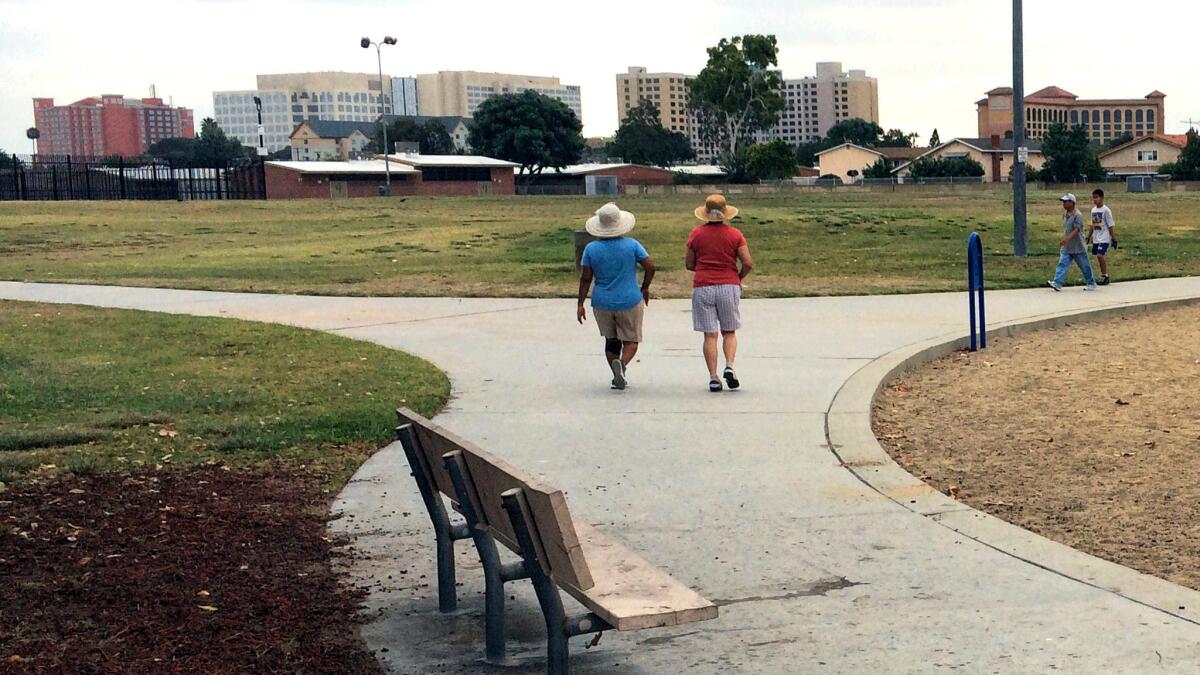California water conservation dips as relaxed drought rules take effect

- Share via
Water conservation in California dipped slightly during the first month that the state’s mandatory water-savings rules were significantly relaxed, regulators said Tuesday.
The 21.5% cut in water use in June compared with the same month in 2013 was less impressive than some officials had hoped, but also came as a relief because the numbers suggest that urban Californians will continue to save water — even when they are not required to do so.
June marked the first time in a year that many of the state’s more than 400 local water agencies were not under orders to cut their consumption by a certain percentage.
Under the latest set of emergency drought rules, water districts were given the power to “self-certify” that they have enough supply to meet future demand and set their own savings targets.
Many districts have already submitted calculations showing that they pass the state’s so called stress test and therefore can do away with mandatory water conservation.
At Tuesday’s State Water Resources Control Board meeting, some speculated that the relaxed regulations may have caused conservation efforts to flag in June. Water board staff members noted that urban Californians had cut their water consumption 27.5% in June 2015, a more significant savings than in June of this year.
“Californians have continued to conserve without top-down mandates, but the question is whether we can save enough and keep it up for the long haul,” said water board Chairwoman Felicia Marcus. “Some relaxation of conservation in light of the relief we got last winter and other supply conditions is appropriate and expected; abandonment of conservation is not.”
David Bolland, special projects manager for the Assn. of California Water Agencies, which represents hundreds of the state’s local water districts, acknowledged that June data showed a relative increase in water use. But he emphasized that the numbers also show that “Californians have really gotten the message” and have made saving water a matter of habit.
Gov. Jerry Brown ordered mandatory statewide water conservation more than a year ago as a way to blunt the impacts of California’s multiyear drought. For nine months local water districts were instructed to cut their water consumption by varying amounts or face fines. Then the board revised the rules and reduced many of those conservation targets.
In May, the board revised the rules again, and, recognizing that winter rains had helped the state’s hydrology, gave water districts the power to discard mandatory water conservation altogether if they could prove that they have enough supply to meet their customers’ current and future water needs.
Subsequently, suppliers such as the Los Angeles Department of Water and Power, Long Beach Water Department and Coachella Valley Water District set their conservation targets at 0%.
In an interview last week, Tim Quinn, executive director of the Assn. of California Water Agencies, emphasized that water providers that set their targets at 0% can do so only because they are well-prepared to cope with a prolonged water shortage.
A 0% conservation standard, he said, signifies that a water district has passed the state’s stress test “with flying colors,” but some members of the public may incorrectly assume that the 0% conservation target means their water district no longer cares about conservation.
“Calculating a zero … means you’re drought-prepared because of the action you and your community has taken,” Quinn said. “That’s a good thing, not a bad thing.”
Water board staff members said Tuesday that they were still reviewing the piles of paperwork submitted by water districts and hoped to provide an update by the middle of August. That update could include a list of all of the water suppliers and their self-certified conservation standards.
Many of those standards are expected to be 0%. But on Tuesday, staff members also said that 31 suppliers have not submitted their paperwork and would therefore retain their current targets. Officials did not specify which suppliers were among the tardy 31.
The current state regulations expire at the end of January.
Twitter: @ByMattStevens
ALSO
Pilot killed in a plane crash near Van Nuys Airport
‘Catastrophic’ charter bus crash leaves five dead, L.A. driver seriously injured
‘Speed may have been a factor’: Families grieve as 3 bodies are pulled from wrecked truck
More to Read
Sign up for Essential California
The most important California stories and recommendations in your inbox every morning.
You may occasionally receive promotional content from the Los Angeles Times.











